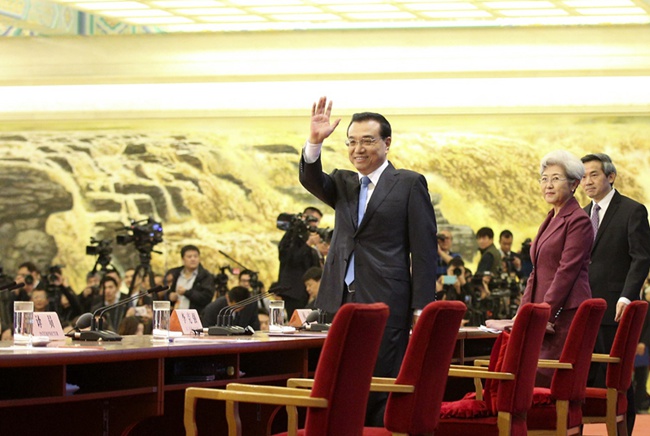Premier Li heads "down under" to encourage stronger trade links

By David Maguire
Fresh from two weeks of legislative and political advisory meetings with China’s elite lawmakers in Beijing, a newly-buoyant Premier Li Keqiang is back on the road leading a large delegation for a week of talks in Australia and New Zealand.
The trade and cultural ties China has built with the two southern hemisphere nations over many decades will underpin discussions Mr. Li has with political and business leaders. His visit is per invitation from the Australian and New Zealand prime ministers.
It is the first visit to Australia by a Chinese premier in more than 10 years and Mr. Li's busy schedules in both countries will feature high level meetings with the respective leaders, Mr. Malcolm Turnbull and the relatively new Kiwi PM, Mr. Bill English.
These two Oceanic trading partners enjoyed a trade surplus against China last year and the extensively networked economic and geopolitical relationships they share are generally stable and mutually beneficial.
The figures tell the story.
China is Australia's largest trading partner for both imports and exports. It is China's sixth largest trading partner and its major exports are iron ore, coal and a wide range of services, including education. Around 25% of Australia's manufactured imports come from China. A record 1.2 million Chinese tourists visited in 2016 and more are expected in the current China-Australia Tourism Year.
New Zealand's top two export destinations for goods and services are Australia and China. Its major exports to China are milk powder, butter and cheese. Two-way trade with China was worth NZ$23 billion in 2016, a year when it also hosted 409,000 Chinese visitors who spent $2,551 million.
Notwithstanding these two-way exchanges of goods and services, however, the countries' regional dynamics have been snared in the global trade turmoil generated since January by the United States' retreat into a protectionist mindset.
The Barack Obama-supported Trans-Pacific Partnership (TPP), which Australia and New Zealand signed on to, was unceremoniously scuttled by his successor, removing a potential trade bloc obstacle to China's avowed commitment to globalization and one it didn't support.
The 12 member countries of the TPP trade deal have since been trying to formulate an alternative Asia-Pacific pact. But China has been advocating to them a reconfigured Regional Comprehensive Economic Partnership, a 16-nation trade deal that would include New Zealand and Australia.
The timing of Mr. Li's visit, the prevailing sentiment on trade from a seemingly intransigent White House, and the economic imperatives in trade-dependent Australia and New Zealand could facilitate more substantive discussion on China's proposal.
Mr. Li is renowned for striking new deals and alliances in his flag-waving role on the road pushing China's interests while leveraging open new markets with other nations.
In a visit to Canada last year he signed 29 agreements involving commercial and economic relationships, agreed to double bi-lateral trade by 2025, and to explore the possibility of a China-Canada free trade agreement. In Cuba, he struck 20 alliances to boost economic cooperation and to enhance the strategic partnership.
Australia's Mr. Turnbull has indicated that a new phase in the 15-month-old Australia-China free trade deal will be discussed during Mr. Li's visit. The talks could include more alliances in the fields of energy, research, innovation, law enforcement, education, and tourism.
In New Zealand, the main thrust of Mr. Li's talks is expected to be on free trade but a local international business forum has flagged that Kiwi companies are interested in becoming involved in China's One Belt, One Road initiative which involves a Silk Road Economic Belt and 21st-Century Maritime Silk Road.
Mr. Li is also expected to suggest greater Australian involvement in this massive infrastructure project linking China to Asia.
Chinese consumers look to both countries for the quality of their primary industry goods, including beef, dairy and wine, among others, and as respective free trade agreements settle, mature and expand, more latitude is theoretically possible under Beijing's belief in the interconnectivity of borderless markets.
But further expansion of trade is also built on stronger relationships and trust and, more importantly, clean and clear two-way traffic free of bureaucratic road blocks.
Businesses and trade officials in discussion with Mr. Li and his delegates during this visit, therefore, will inevitably be pushing for greater access to China's massive and expanding middle-class cities through a lowering or elimination of export impediments.
Mr. Li's visit will run from March 22 to 29 and he will be accompanied by his wife Cheng Hong.
Dr. David Maguire is a regular radio and online commentator for China Radio International.






